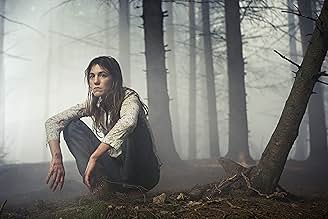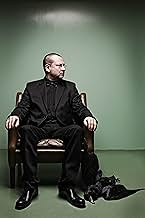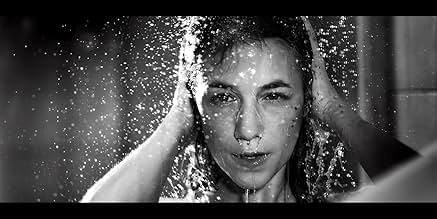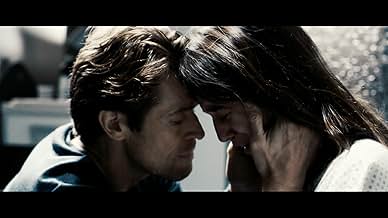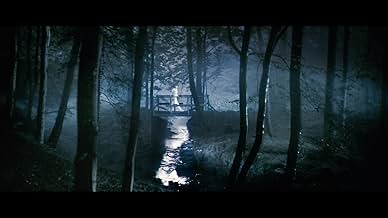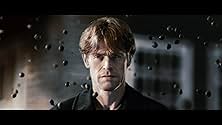Ein trauerndes Paar zieht sich in ihre Hütte im Wald zurück, in der Hoffnung, ihre gebrochenen Herzen und ihre gestörte Ehe zu reparieren, aber die Natur nimmt ihren Lauf und die Dinge gehen... Alles lesenEin trauerndes Paar zieht sich in ihre Hütte im Wald zurück, in der Hoffnung, ihre gebrochenen Herzen und ihre gestörte Ehe zu reparieren, aber die Natur nimmt ihren Lauf und die Dinge gehen von schlecht zu schlecht.Ein trauerndes Paar zieht sich in ihre Hütte im Wald zurück, in der Hoffnung, ihre gebrochenen Herzen und ihre gestörte Ehe zu reparieren, aber die Natur nimmt ihren Lauf und die Dinge gehen von schlecht zu schlecht.
- Regie
- Drehbuch
- Hauptbesetzung
- Regie
- Drehbuch
- Hauptbesetzung
- Auszeichnungen
- 21 Gewinne & 33 Nominierungen insgesamt
Empfohlene Bewertungen
John Doe says in "Se7en": "Wanting people to pay attention, you can't just tap them on the shoulder. You have to hit them in the head with a sledgehammer." L. von Trier was tapping on the shoulder with "Dogville". He turns to a sledgehammer with "Antichrist". The problem is that when you have been hit by the extremities of his latest endeavor the most appropriate question you may want to ask seems to be suggested by the next line of the late detective Mills: "What makes you so special that people should pay attention?"
This movie doesn't strike as an overt emotional manipulation like "Dancer in the Dark" (the fact that the latter is really something that can be described in such a way was eventually admitted even by the director himself). The cinematography is stunning - in a good sense of the word. Several frames with Willem Dafoe's face will certainly enter the gallery of iconic images provided by modern cinema. Even the dedication to Tarkovsky was not vain. But von Trier is neither stupid/ talentless nor childish/egocentric - hopefully, at least - to the extent to actually consider making movies a kind of therapy, and the screening room his own private couch at a shrink's. So he is trying to bring in a meaning here after all. If so what is it?
What is that point he is trying to deliver? Human nature is far from being perfect? It's hardly new news. The aesthetic audacity and harshness of images in "Dogville" were fully justified by a consistency of its message, which they conveyed in a completely adequate way. As far as I can see, von Trier was talking then about the unbearable hypocrisy of our modern civilization and an inevitable catastrophe this civilization is heading for (while his account made I'm afraid a pretty accurate description of the actual situation). What does he have to add with this feature? Is it that all evil which falls upon people is intrinsically immanent in human nature? Having experienced or witnessed a critical amount of grief, pain and despair man comes to some point when even a concept of good, God, hope or whatever you call it is becoming virtually inconceivable? And after that chaos reigns? That to fight that man has to kill an evil in himself which he might love? But this fight is doomed anyway if a natural arena for it happens to be a world "issued by Satan"? It's a kindergarten philosophy. Some of these things may very well be true and correct, but to make all these daring assumptions and observations it's quite sufficient to have read a dozen of books or had just one good look around. There can be several more interpretations - some somewhat less coherent, some even more banal. What are justifications of all this excruciating imagery we encounter in "Antichrist" then? It's not quite clear.
So I should say that it is a bit surprising that the audience has happened to be so polarized. In fact, this movie is neither too good, nor too bad. And I might be missing something but I have a strong feeling that von Trier can be quite justly accused on this particular occasion of doing something he was quite wrongly accused of doing on some previous ones - of trying to compensate in a badly provocative manner a certain shallowness of his work and its half-baked message by the extremities of the way in which they are presented.
This movie doesn't strike as an overt emotional manipulation like "Dancer in the Dark" (the fact that the latter is really something that can be described in such a way was eventually admitted even by the director himself). The cinematography is stunning - in a good sense of the word. Several frames with Willem Dafoe's face will certainly enter the gallery of iconic images provided by modern cinema. Even the dedication to Tarkovsky was not vain. But von Trier is neither stupid/ talentless nor childish/egocentric - hopefully, at least - to the extent to actually consider making movies a kind of therapy, and the screening room his own private couch at a shrink's. So he is trying to bring in a meaning here after all. If so what is it?
What is that point he is trying to deliver? Human nature is far from being perfect? It's hardly new news. The aesthetic audacity and harshness of images in "Dogville" were fully justified by a consistency of its message, which they conveyed in a completely adequate way. As far as I can see, von Trier was talking then about the unbearable hypocrisy of our modern civilization and an inevitable catastrophe this civilization is heading for (while his account made I'm afraid a pretty accurate description of the actual situation). What does he have to add with this feature? Is it that all evil which falls upon people is intrinsically immanent in human nature? Having experienced or witnessed a critical amount of grief, pain and despair man comes to some point when even a concept of good, God, hope or whatever you call it is becoming virtually inconceivable? And after that chaos reigns? That to fight that man has to kill an evil in himself which he might love? But this fight is doomed anyway if a natural arena for it happens to be a world "issued by Satan"? It's a kindergarten philosophy. Some of these things may very well be true and correct, but to make all these daring assumptions and observations it's quite sufficient to have read a dozen of books or had just one good look around. There can be several more interpretations - some somewhat less coherent, some even more banal. What are justifications of all this excruciating imagery we encounter in "Antichrist" then? It's not quite clear.
So I should say that it is a bit surprising that the audience has happened to be so polarized. In fact, this movie is neither too good, nor too bad. And I might be missing something but I have a strong feeling that von Trier can be quite justly accused on this particular occasion of doing something he was quite wrongly accused of doing on some previous ones - of trying to compensate in a badly provocative manner a certain shallowness of his work and its half-baked message by the extremities of the way in which they are presented.
Down the road from me is a coven of Christian filmmakers. It is a school and the purpose is to make films that evangelize. This fascinates me; generally their stories are about fighting the devil, a narrative that encompasses both what is in the film and what surrounds the making of the film. Some day, they might make engaging films and who knows what will happen.
This interests me because most movies are made by professional storytellers. Scorcese and Fincher (for example) not only makes a wide variety of stories, but they deliberately do so. The connection with their lives is — with few exceptions — with the art. Most singers are this way as well. Connected with this is films that have a love story that features a woman the male filmmaker is in love with. This often grabs me.
Now here we have a man deeply depressed, possessed. He makes a film painfully pulled from his soul, so difficult in the making that he is suicidal. It works. It is so deeply disturbing that I caution you to stay away from it. I was a bit vulnerable when encountering this world and it affected me.
Lars von Trier has built a life making films that exploit experiments in convention. I find them interesting, but there is always an academic distance that keeps them from connecting. They engage for how they are made, not what they are. At each juncture, I wonder how powerful a film might be if he used what he knows to communicate, rather than to practice. Now I know. He was so depressed he simply made. Looking at the usual areas where he is disciplined, you can see he is sloppy. Everything is imprecise. There is no theory at work here. Where it is technically competent, it is only temporarily so. That is what makes it so, so very powerful. His gush of expression floods past his constraints of Danish discipline.
The story is identical to "Don't Look Now." We as viewers think we see a child lost, and follow a couple in a grief that swallows them. But we see it from the husband's untrusted eye. He is confused, haunted, magically twisted through the sexual magic he and we see but which permeates and guides the narrative. This is a tornado of witchcraft, like the Roeg film, but from a filmmaker within it. Causal mechanics are not what we think we know from the beginning. The shoes are reversed. I do not know from outside sources what caused his depression, but it is pretty clear from this desperate message from within.
There are some pretty powerful images here. Some involve genitals, an ordinarily off-limits zone. Some involve a graceful death of an infant, made more terrifying by the beauty in which we receive it. Some involve damaged animals. Each of these is amplified by the rush of emotional confusion, the onanistic waterfall of acorns on the tin roof. Experience this at your peril.
The actors are incredible.
Ted's Evaluation -- 3 of 3: Worth watching.
This interests me because most movies are made by professional storytellers. Scorcese and Fincher (for example) not only makes a wide variety of stories, but they deliberately do so. The connection with their lives is — with few exceptions — with the art. Most singers are this way as well. Connected with this is films that have a love story that features a woman the male filmmaker is in love with. This often grabs me.
Now here we have a man deeply depressed, possessed. He makes a film painfully pulled from his soul, so difficult in the making that he is suicidal. It works. It is so deeply disturbing that I caution you to stay away from it. I was a bit vulnerable when encountering this world and it affected me.
Lars von Trier has built a life making films that exploit experiments in convention. I find them interesting, but there is always an academic distance that keeps them from connecting. They engage for how they are made, not what they are. At each juncture, I wonder how powerful a film might be if he used what he knows to communicate, rather than to practice. Now I know. He was so depressed he simply made. Looking at the usual areas where he is disciplined, you can see he is sloppy. Everything is imprecise. There is no theory at work here. Where it is technically competent, it is only temporarily so. That is what makes it so, so very powerful. His gush of expression floods past his constraints of Danish discipline.
The story is identical to "Don't Look Now." We as viewers think we see a child lost, and follow a couple in a grief that swallows them. But we see it from the husband's untrusted eye. He is confused, haunted, magically twisted through the sexual magic he and we see but which permeates and guides the narrative. This is a tornado of witchcraft, like the Roeg film, but from a filmmaker within it. Causal mechanics are not what we think we know from the beginning. The shoes are reversed. I do not know from outside sources what caused his depression, but it is pretty clear from this desperate message from within.
There are some pretty powerful images here. Some involve genitals, an ordinarily off-limits zone. Some involve a graceful death of an infant, made more terrifying by the beauty in which we receive it. Some involve damaged animals. Each of these is amplified by the rush of emotional confusion, the onanistic waterfall of acorns on the tin roof. Experience this at your peril.
The actors are incredible.
Ted's Evaluation -- 3 of 3: Worth watching.
Controversial, much lauded and horrific to watch, ANTICHRIST is Lars von Trier's showpiece film. It tells the tale of an unhappy marriage that breaks down due to grief, and the extremes that follow. It's a film that plays out as a two-hander for the most part, with Dafoe and Gainsbourg acting it up in a remote woodland cabin and taking out their rage and anger upon each other.
The film's simple storyline allows von Trier to concentrate on the things that interest him most. His intelligent, thoughtful script goes deep into the psyche of his characters, exploring the ways in which therapy can – and in some ways, cannot – help a parent to get over the loss of their child. The first half of the film is packed with foreboding that gives way to visceral horror in the second half.
Everything you've heard about this film's explicit nature is true; nothing much makes me squeamish anymore, but ANTICHRIST did. I can't stand sexual violence in films and von Trier incorporates it to chilling, disturbing effect, made all the more powerful due to its brief nature. In many ways, the second half of this film becomes HOSTEL in the woods, except it's all the more frightening because violence comes from a loved one rather than a stock villain.
Dafoe and Gainsbourg are both very good; they couldn't not be, seeing as what von Trier asks of them. Dafoe plays the more sympathetic role and Gainsbourg's character is a little shrill on occasion, but neither of them disappoint. Von Trier directs in classic art-house style with beautiful shots interspersed with grotesque imagery and true left-of-field interludes.
It's certainly not a film for the faint of heart or an experience I would choose to put myself through again, but I think that ANTICHRIST is a great example of a director following his vision without compromise.
The film's simple storyline allows von Trier to concentrate on the things that interest him most. His intelligent, thoughtful script goes deep into the psyche of his characters, exploring the ways in which therapy can – and in some ways, cannot – help a parent to get over the loss of their child. The first half of the film is packed with foreboding that gives way to visceral horror in the second half.
Everything you've heard about this film's explicit nature is true; nothing much makes me squeamish anymore, but ANTICHRIST did. I can't stand sexual violence in films and von Trier incorporates it to chilling, disturbing effect, made all the more powerful due to its brief nature. In many ways, the second half of this film becomes HOSTEL in the woods, except it's all the more frightening because violence comes from a loved one rather than a stock villain.
Dafoe and Gainsbourg are both very good; they couldn't not be, seeing as what von Trier asks of them. Dafoe plays the more sympathetic role and Gainsbourg's character is a little shrill on occasion, but neither of them disappoint. Von Trier directs in classic art-house style with beautiful shots interspersed with grotesque imagery and true left-of-field interludes.
It's certainly not a film for the faint of heart or an experience I would choose to put myself through again, but I think that ANTICHRIST is a great example of a director following his vision without compromise.
Lars Von Trier is a director who's always been going his own ways, and this can definitely be seen in this movie. Antichrist is a movie that doesn't hold anything back when it comes to gore, and the stuff that you see in the film won't leave your mind the next couple of days. But the movie itself is much more than that... The movie is beautifully shot, the story and setting extremely uncomfortable and the acting is fantastic. The movie is sometime painful to watch, not in a "Saw" or "Hostel" kind of way, but when you leave the theater you feel genuinely uncomfortable, and that is one of the reasons why i liked this movie. It's a movie like nothing i've experienced and I'm glad that we have directors like Lars Von Trier that dares to make a film like this. It's nothing like the mainstream movies that are being made nowadays, and it makes your mind race when you leave the theater, something very few movies does. You aren't served with facts, as with any other movies, but are left to interpret and think for yourself. It's a bizarre movie and not one for the faint of heart, but if you dare to be provoked and see a movie like nothing you've ever seen, then go see Antichrist.
OK...so I just finished AntiChrist, there has never been a movie that made me feel the way I do after viewing it...it was one of the most emotionally draining, horrific, beautiful films I have ever seen in my life...after watching it I feel like I just watched a loved one die. it took ten minutes for me to calm down and stop crying...this might be one of the greatest horror films ever made. So if you see it, be careful. It is really powerful. I know a little about Von Trier and have seen a handful of his films...this one, for me, takes the cake, over many movies out in the world. If you do get to see this, and are ready for a crazy ride, just remember, think about who you show this to before you do it, it is not for everyone that is into horror.
Wusstest du schon
- WissenswertesThe Sound Engineer actually swallowed a microphone and recorded the inner audio of his body in order to achieve certain similar sounds for the film.
- PatzerDuring the prologue, there is shot of a foot knock over a bottle from the far end of the bed. In a later shot, the same bottle is rolling on the bedside as He and She have sex.
- Zitate
Fox: Chaos reigns.
- VerbindungenFeatured in At the Movies: Cannes Film Festival 2009 (2009)
- Soundtracks'Lascia ch'io pianga' from 'Rinaldo'
Composed by George Frideric Handel (as Georg Friedrich Händel)
Performed by Tuva Semmingsen and Barokksolistene
Top-Auswahl
Melde dich zum Bewerten an und greife auf die Watchlist für personalisierte Empfehlungen zu.
Details
- Erscheinungsdatum
- Herkunftsländer
- Sprache
- Auch bekannt als
- Anticristo
- Drehorte
- Produktionsfirmen
- Weitere beteiligte Unternehmen bei IMDbPro anzeigen
Box Office
- Budget
- 11.000.000 $ (geschätzt)
- Bruttoertrag in den USA und Kanada
- 404.122 $
- Eröffnungswochenende in den USA und in Kanada
- 71.397 $
- 25. Okt. 2009
- Weltweiter Bruttoertrag
- 7.426.651 $
- Laufzeit1 Stunde 48 Minuten
- Farbe
- Sound-Mix
- Seitenverhältnis
- 2.35 : 1
Zu dieser Seite beitragen
Bearbeitung vorschlagen oder fehlenden Inhalt hinzufügen





